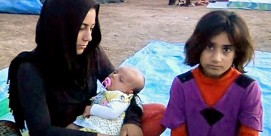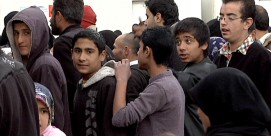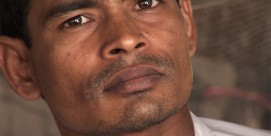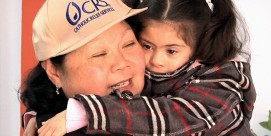In This Episode << SLIDE LEFT TO SEE ADDITIONAL SEGMENTS
Blocking the Good Samaritan in Burma
by Anne-Marie Slaughter
The death toll continues to rise in Burma, also known as Myanmar. As of this writing at least 32,000 people have died and that number is expected to rise significantly in the days ahead. Most of us have seen the photos, watched the video footage, and read reports of the cities and villages devastated by the cyclone — bloated corpses clogging the rivers, starving villagers huddled in monasteries, and the rising tide of water-borne disease. Meanwhile, the Burmese government is blocking or slowing aid flights and visas for hundreds of aid workers from around the world, insisting that all aid be delivered to and distributed by Burma’s military.
On Monday (May 12) the normally reserved United Nations Secretary General Ban Ki-Moon expressed “immense frustration” with Burma’s military dictatorship, the diplomatic equivalent of pounding his shoe on the table. Ban’s plea followed an earlier outburst by French foreign minister Bernard Kouchner, who argued that the Burmese crisis was large enough in scope to force a U.N. resolution on the issue, based on the “responsibility to protect” doctrine. Responsibility to protect (R2P in shorthand) is a relatively new concept in foreign affairs, but one which was adopted by the U.N. General Assembly in 2005 and which in essence recognizes that the international community — that is, U.N. member states — have a right to intervene through U.N.-sanctioned collective action when countries cannot or will not protect the human rights of their own people against serious violations of international law.
 Survivors of Cyclone Nargis reach for used clothes from a local donor at a village destroyed by the cyclone, south of Yangon, May 12, 2008. (REUTERS/STR New) |
Kouchner touched off a diplomatic firestorm. Even some proponents of R2P, including the U.N. Secretary General’s special advisor for R2P issues, Professor Ed Luck, argue that the doctrine would be misapplied if the international community were to intervene in the case of Burma — that R2P is to be specifically applied to crimes against humanity, war crimes, and ethnic cleansing.
Luck is right, but in my view the deliberate blocking of aid that could avert the deaths of tens if not hundreds of thousands of Burmese people constitutes a crime against humanity. The world is not obliged to come to the aid of the Burmese people; that is precisely the job of their government. But if governments, aid groups, and individuals around the world reach out to the Burmese simply on the basis of our common humanity and the corollary desire to stop suffering where we can, then the Burmese junta’s determination to put itself between its people and that aid is nothing short of murderous.
Beyond the law, however, is the even more vital question of what practical steps can be taken to give the R2P doctrine effect — or simply to change the situation on the ground. Sending helicopters into Burmese airspace without permission is likely simply to add violence and bloodshed to the Burmese people’s woes, creating a war out of a natural disaster. Sanctions against Burma as a whole simply punish those who are suffering. Sanctions aimed at changing the lifestyles of individual junta members and their families could be more effective, but have presumably been tried. Other alternatives include inviting the prosecutor for the International Criminal Court to prosecute individual members of the junta for crimes against humanity, or working intensively with the Association of Southeast Asian Nations (ASEAN) to suspend or even expel Burma unless it accepts aid. ASEAN has just passed a charter of human rights; Burma makes it a mockery. ASEAN diplomats will argue that carrots work better than sticks, but then they must come up with the carrots that work — immediately.
Burma’s generals are forcing the world’s citizens to stand by and watch their people die. We have the legal doctrine to authorize action, but actually saving lives in Burma now requires both political will and practical tools.
Anne-Marie Slaughter is dean of Princeton University’s Woodrow Wilson School of Public and International Affairs and the author of THE IDEA THAT IS AMERICA: KEEPING FAITH WITH OUR VALUES IN A DANGEROUS WORLD (Basic Books, 2007). She has written for Religion & Ethics NewsWeekly on Pope Benedict XVI’s UN address, and she spoke last year with R & E about faith, values, and foreign policy.







